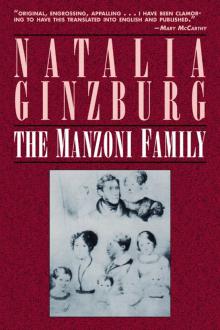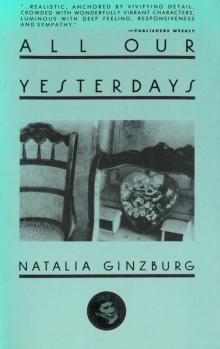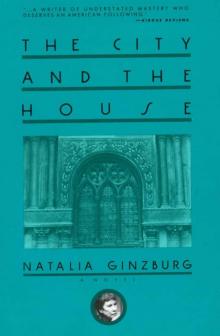- Home
- Natalia Ginzburg
The Manzoni Family
The Manzoni Family Read online
The Manzoni Family
Alessandro Manzoni
ALSO BY NATALIA GINZBURG
All Our Yesterdays
The City and the House
Family Sayings
The Little Virtues
The Road to the City
Voices of the Evening
NATALIA GINZBURG
The Manzoni Family
A Novel
Translated from the Italian by Marie Evans
ARCADE PUBLISHING • NEW YORK
Copyright © 1983 by Giulio Einaudi s.p.a., Turin
English-language translation copyright © 1987, 2013 by Marie Evans
All Rights Reserved. No part of this book may be reproduced in any manner without the express written consent of the publisher, except in the case of brief excerpts in critical reviews or articles. All inquiries should be addressed to Arcade Publishing, 307 West 36th Street, 11th Floor, New York, NY 10018.
Arcade Publishing books may be purchased in bulk at special discounts for sales promotion, corporate gifts, fund-raising, or educational purposes. Special editions can also be created to specifcations. For details, contact the Special Sales Department, Arcade Publishing, 307 West 36th Street, 11th Floor, New York, NY 10018 or [email protected].
Arcade Publishing® is a registered trademark of Skyhorse Publishing, Inc.®, a Delaware corporation.
Visit our website at www.arcadepub.com.
10 9 8 7 6 5 4 3 2 1
Library of Congress Cataloging-in-Publication Data is available on file.
ISBN: 978-1-61145-717-9
Printed in the United States of America
Contents
Family Tree
Foreword
Part One 1762-1836
Giulia Beccaria I
Giulia Beccaria II
Enrichetta Blondel I
Enrichetta Blondel II
Fauriel
Giulietta
Part Two 1836-1907
Teresa Borri I
Teresa Borri II
Vittoria
Matilde
Stefano I
Stefano II
Stefano III
List of Characters
Italy in the Risorgimento
Foreword
The book is intended as an attempt at a detailed reconstruction and a reshaping of the story of the Manzoni family, through their letters and the things we know about them. It is a story that is scattered in various books, most of them unobtainable in bookshops. It is full of gaps, absences, obscurities, like any family history one might try to piece together. These gaps and absences cannot be filled.
I had never written a book like this, requiring other books and documents. I had written novels born of invention or of my memories, dependent on nothing and no one outside myself.
Therefore I must thank some people who have helped me.
I must thank Donata Chiomenti Vassalli. The first thing I read was her book, Giulia Beccaria, published some years ago by Ceschina and never republished, goodness knows why. I must thank her for her very fine book. And I must thank her for listening to me, lending me books, making suggestions.
I must thank Cesare Garboli for listening to me, making suggestions, and for his usual great, irascible, generous patience.
I also thank Signora Letizia Pecorella and Signorina Maria de Luca of the Braidense Library; Signora Jone Caterina Riva of the Centre for Manzoni Studies, in Milan; and in Rome, Signora Annamaria Giorgietti Vichi, Director of the Biblioteca Nazionale, and Alessandro Florio. They have helped me in many different ways, making books and letters available to me.
Finally I thank Enrica Melossi and Augusta Tosone, who provided the illustrations [not included in this edition].
I dedicate this book to my friend Dinda Gallo. She knew all about the Manzoni family, and I nothing. I just felt a simple curiosity about this family’s destiny. The desire to know it more intimately and thoroughly grew out of my conversations with her. And so, as I wrote, I would take the pages to her to read. She shared my perplexities and uncertainties. She shared my frustration at the gaps and absences. She was a generous guide and companion along the way. Without her I would not have written this book, which is why I dedicate it to her.
Some letters were in French in the original, and were translated into Italian by Natalia Ginzburg, though she ’would have preferred to leave them in French’. All the letters between Manzoni and Fauriel were in French, except the first in Italian from Manzoni. All the letters addressed to Fauriel, from Giulia, Giulietta etc., were in French. Enrichetta’s letters were all in French, as were those following: Giulietta to Cristina (from Andeer), Giulietta to her father (from Castello d’Azeglio), Giulia to her friend Euphrosine Planta, and Teresa to Aunt Notburga.
Part One
1762-1836
Giulia Beccaria I
Giulia Beccaria had red hair and green eyes. She was born in Milan in 1762. Her father was Cesare Beccaria and her mother Teresa de Blasco; he belonged to the nobility, she was the daughter of a colonel. The marriage had met with bitter opposition. The couple had financial difficulties, but they always lived extravagantly. When he was very young Cesare Beccaria wrote a book which brought him a certain fame, Of Crimes and Punishments. Teresa was a graceful woman with black hair. She became the mistress of a rich man called Calderara. A frequent visitor to their house was Pietro Verri, economist, philosopher, lover of one of Cesare’s sisters. Relations between Verri and the two Beccarias were always somewhat stormy, they would quarrel and make it up again.
Giulia was four when her sister Marietta was born. The same year her mother contracted venereal disease, but she continued to travel and lead a worldly life. Then she gave birth to a boy who died immediately. The father longed for a son. Giulia and her sister were brought up by servants, because their mother, although ill, was always travelling. In 1774 she died of her illness in appalling suffering. The father was in despair. The day she died he demanded an inventory of her many clothes and jewels. He called the two little girls to him and said ‘It’s all yours’. He clasped them in his arms, weeping. But the girls never saw the clothes and jewels again. He went off to weep in the opulent house of his wife’s lover, Calderara. The girls stayed home with the servants. A few days later Calderara was astonished to see him having his hair curled by the barber. He told Calderara: ‘I want to keep up appearances.’ Forty days after his wife’s funeral he became engaged to a beautiful rich woman, one Anna Barbò. Three months later he married her. In the end he had by her the son he wanted. Meanwhile Giulia had been put into a convent. Marietta stayed at home because she was frail, rickety and hunch-backed. She was put in an iron corset and consigned to a life of domestic slavery. In the convent Giulia was utterly forgotten. Her paternal grandparents were dead, and a maternal uncle who was fond of her was abroad at the time living in Brazil. The only person who remembered Giulia was Pietro Verri. He used to come and see her occasionally in the convent parlour. When she was eighteen, he persuaded her father to take her back into his house.
Giulia was a very beautiful, healthy, intelligent girl with a strong character. From the first she had violent quarrels with her father. Then she fell in love with Giovanni Verri, a younger brother of Pietro, Knight of the Cross of Malta, an idle, elegant man with girlish features. But there could be no question of marriage. Neither the Verris nor her father would consider it. Giulia was not rich. So Pietro Verri and Cesare Beccaria looked round and hit on a certain country nobleman called Don Pietro Manzoni, a childless widower of forty-six, not rich but with a modest affluence. He had a property near Lecco called II Caleotto where he used to spend the summer. In the winter he lived in Milan in a house on the Navigli in via San Damiano. He proved re
asonable about the dowry. Thus the marriage was swiftly arranged. Giulia simply wanted to get out of her father’s house.
Don Pietro Manzoni lived with seven unmarried sisters, one an ex-nun, and had a brother, a Monsignore, who was a canon at the Cathedral. Giulia was very unhappy from the start. She quarrelled with her husband and her sisters-in-law were hostile. The house on the Navigli was ugly, small, damp and dark. Her husband seemed to her a wretched creature, without intelligence, without great wealth and without prestige. He was conservative and clerical, while she had breathed in new liberal ideas, both in her father’s house and in the Verri family. She was desperately bored. She continued to see Giovanni Verri and to frequent the fine Verri house, always full of guests and gaiety. She led a brilliant life and aroused in her in-laws increasingly manifest hostility, and in her husband the urge to spy on her.
Three years after her marriage, on 7 March 1785, she gave birth to her first and only son, Alessandro. He was named after the father of the Manzonis, and baptised at the church of San Babila. His birth pleased nobody. Quarrels between Giulia and her husband became more bitter. People were talking.
The baby was immediately put out to nurse at Malgrate, near Lecco. Giulia took up her old life again. But she was tired of Giovanni Verri and he of her. She had a relationship with a certain Taglioretti. Meanwhile Alessandro was growing up with the nurse in a peasant home, loved by the nurse and her many relatives. His mother rarely came to see him. Then he was taken back to Milan, but always returned to the nurse for long periods. Andrea Appiani painted a portrait of Giulia with the little boy, in which she is dressed in a riding habit. Her face is hard, bony and weary. She is gazing into space, and shows no sign of maternal affection for the little four-year-old boy leaning against her knee. Giulia gave the portrait to Giovanni Verri.
It was at that time that she got to know Carlo Imbonati. She met him in the salon of his sister, who had been a schoolfriend of hers at the convent. There is a second portrait of Giulia painted by a woman called Cosway not many years after the Appiani with the child. It was painted in Paris where Giulia was living with Imbonati and where she was happy. In this one she is wearing a little white cap and veil. Her nose is delicate and there is a certain humorous shrewdness in the faint smile on her lips. She looks very young. The years and the bitterness have fallen from her face.
Carlo Imbonati came from a rich, aristocratic family. As a boy, Parini had been his tutor. As an adult he lived abroad for a long time. He had only just returned to Italy when he and Giulia met. They became lovers. Giulia promptly decided to leave her husband. Love gave her strength and she resolved to bring things to a head. During her relationship with Giovanni Verri she had not thought of asking for a separation, feeling she lacked moral and material support, and also feeling infected by his idleness. Now it was all different. She wrote to Pietro Verri. He was the only person who had come to see her in the convent; and he had given her some support, even if it had proved to be very dubious since he had combined with her father to lead her into that unhappy marriage. She wrote to him:
’It is absolutely impossible for me to live with a family who are all hostile to me. My husband, fired by sacred zeal, wishes at all costs to procure me a place in Paradise through suffering here below; Monsignore [the canon of the Cathedral] sits in his villa refining ideas to impose upon his brother, who comes home, scours all the rooms and even searches behind the pictures, I suspect. The ex-nun takes it upon herself to keep creeping downstairs to hear what is being said, and then goes to report it all to the worthy Prelate, who, poor fellow, is troubled by a fairly obvious beam in his own eye. This is the picture of my family life. I have opened my heart to you by word and by letter, for I felt I must invoke your humanity on my behalf. Unfortunately I fear I may be deceiving myself, since I see you still maintain that friendship to which I was once innocently sacrificed. But at the time my father alone was responsible for my unhappiness; he knew me and the man he intended me to marry. You knew none of the circumstances, so your concern for my establishment arose from your affection for me and my father. Now things are quite different. Now that you are aware of my desperate circumstances, can you wish for a reconciliation which would make me a wretched, unhappy slave, simply because you are reluctant to oppose the effects of my father’s despotism? He does not feel the horror of my situation, but is merely annoyed to see me shake off a yoke he imposed upon me. Forgive, Count Verri, the liberty I take in writing like this, but I am using the one thing no one can give or take from me, that is a strength of character that makes me speak the truth in the same voice whoever I am speaking to. A separation is essential; I can bear my present situation no longer.’
Don Pietro Manzoni then made a bid to keep his wife. She despised him because he did not belong to the high nobility, so he persuaded his brothers to put forward a petition for them to be admitted to the golden book of patricians. The petition was rejected. In any case, the rejection reached him when Giulia had already left.
The separation was legally granted in February 1792; Don Pietro Manzoni pledged himself to make a quarterly allowance of 2,000 lire to his wife; Giulia was supposed to move to the house of her maternal uncle, Michele de Blasco, who had meanwhile returned from South America; nothing was said about the boy, and it was therefore understood that he was to remain in the care of his legitimate father, Don Pietro Manzoni. Giulia took the boy to Merate, to the College of the Somaschi Fathers, and left him there. Before setting off for Merate, she took him to see his grandfather, Cesare Beccaria, who with the years had become enormously fat; Alessandro, who was seeing him for the first time and would never see him again, later recalled him rising heavily from an armchair to get him a chocolate from a drawer. He did not seem too pleased at their visit. Alessandro was then seven.
In 1788 Marietta, Giulia’s sister, had died at twenty-two without ever having left her father’s house, leading the obscure life of an invalid in the servants’ quarters. At her death Giulia had brought an action against her father to obtain the right of inheritance to a portion of her mother’s goods; separated from her husband, she devoted herself more passionately to this legal procedure. She presented a long memorandum of accusations against her father in which she recalled how he had forced her into a marriage which filled her with ‘agitation and repugnance’ and had cheated her of all her maternal inheritance, allotting her a wretched dowry, although after the death of his own father, the Marquis Saverio, he found himself in quite a flourishing situation financially, with lands and houses. But in November 1794, Cesare Beccaria died suddenly, in his room, of an apoplectic fit; Anna Barbò, his widow, decided to come to terms with her step-daughter, and Giulia received much of what she was demanding. She left for Paris with Carlo Imbonati in the autumn of 1796. In May of that year, the French under Napoleon had entered Milan.
Sad and solitary, Don Pietro Manzoni contemplated both the end of his marriage and the end of an era; disorder and confusion reigned in his city; it was thronged with soldiers he hated; he belonged to the past, and all around him he saw the civil and religious stability in which he had lived swept away by a hurricane; he left his home on the Navigli which held too many memories, and moved to a house in Santa Prassede Street; but he spent much of his time in the quiet of II Caleotto; he rarely sent for the boy. One day he received a complaint from the Head of the College of the Somaschi Fathers. Alessandro had cut off his pigtail in an attempt to express his sympathy for the new ideas which were blowing throughout Europe.
In 1797 Pietro Verri too died of an apoplectic fit. As for his brother, Giovanni Verri, he had gone to live at Belvedere on Lake Como with his mistress, one Signora Curoni, and her husband.
Giulia was happy in Paris. At last she had everything she had lacked hitherto. She was free. She lived with a man she loved who loved her, in a great city where the fact that they were not married created no problems, a man with a noble mind and generous nature, a handsome man, who was rich, admired and esteemed by all. They h
ad a fine house in a fine district, in Place Vendôme. They had lots of friends. Suddenly she was pleased with her maiden name of Beccaria, which was known to everyone in cultured and worldly circles. She met with a cordial and lavish reception whereever she went. Everyone remembered her father and his famous book Of Crimes and Punishments. Her long legal battle and bitter, humiliating clashes with her father, and the rancour and resentment that had built up inside her against him, poisoning her life so long, now seemed quite remote and in any case soothed and almost effaced by his death. She rarely thought of her little boy at Merate at the College of the Somaschi Fathers. He was part of a dark former life she despised, and over the boy’s head hung shadows and a sense of guilt that she did not wish to recall. She never wrote to him.
The dearest friends she and Imbonati had in France were a couple who like them lived together unmarried, Claude Fauriel and Sophie de Condorcet. They lived at Meulan near Paris in a house called La Maisonnette that had once been a monastery. Giulia too dreamed of having a house in the country, that she would call La Chaumière.
Sophie de Condorcet was then about thirty. She was dark-haired and olive-skinned. She had led a very eventful life. Her husband, the Marquis de Condorcet, philosopher and mathematician, was a Girondin; when the Girondins fell in 1792, he was pursued and threatened with arrest; he hid in a peasant house; his wife would come to see him dressed as a peasant, and meanwhile she had sued for divorce in order to save their confiscated goods. Then Condorcet tried to escape, was captured, and poisoned himself with stramonium, which he got from a doctor friend, Pierre Cabanis. To support her daughter, her sister and an old governess, the widowed Sophie went to the prisons every day to paint portraits of people condemned to the guillotine. She retrieved part of the confiscated property. One day she met Claude Fauriel walking in the Jardin des Plantes; they shared a love of botany. She took him from Madame de Staël, with whom he had a relationship at that time. But Madame de Staël and Fauriel remained friends.

 Happiness, as Such
Happiness, as Such The Dry Heart
The Dry Heart The Manzoni Family
The Manzoni Family A Place to Live
A Place to Live All Our Yesterdays
All Our Yesterdays The Little Virtues
The Little Virtues The City and the House
The City and the House The Road To The City
The Road To The City Voices In The Evening
Voices In The Evening